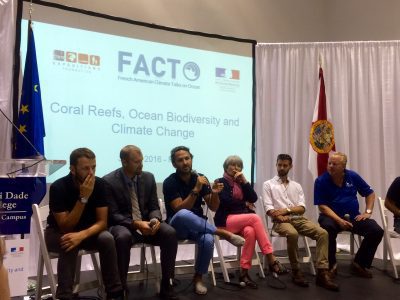By 2050, there will be more plastic by weight than fish in the world’s oceans, according to researchers. Consequently, France has banned single-use plastic bags, halting the country’s consumption of 17 billion bags.
This insight on ocean health and more was shared at the “Coral Reefs, Ocean Biodiversity and Climate Change” conference earlier this month.

Part of the French American Climate Talks on Ocean public conference series, it was organized by the Embassy of France and the Ocean and Climate Platform. Speakers included FIU marine scientists Jeremy Kiszka and Mike Heithaus, as well as researchers from the University of Miami and Tara Expeditions and representatives from the International SeaKeepers Society. Designed to raise public awareness about the ocean’s role in the global climate system, it addressed climate change impacts on coral reefs and ocean biodiversity.
“Most of the problems oceans face, including overfishing, climate change and pollution, are due to people. It’s a simple statement, but it means that each of us can make a difference in the way we consume,” Kiszka said. “We can reduce our impact on fish stocks by avoiding threatened species, including swordfish and tuna; we can reduce carbon dioxide emissions by driving differently; and we can reduce pollution by recycling.”
Kiszka addressed the need to understand the ecology and behavior of animals, including whales, dolphins and sea turtles, to better predict how climate change and human-induced activities will impact them and their role in marine ecosystems. Heithaus, one of the world’s leading shark experts, talked about Global FinPrint, the largest-ever attempt to survey the world’s shark populations. Deploying baited underwater video equipment, he hopes to catch the ocean’s top predators on camera in their natural habitats to gather comprehensive data and protect and replenish these ecologically important animals.
For Kiszka, Heithaus and the speakers, there is not one answer solve the planet’s most pressing environmental issues. Rather, a combination of solutions, including science, outreach, education and advocacy, will help promote coral reef and ocean health in the face of climate change.
“Advocate for that one issue you’re passionate about, because you can’t do everything,” Heithaus said. “Small, local actions add up and have a big impact. And pass it along. Pass on knowledge and encourage activism.”





